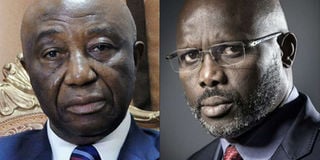Liberia holds breath as Supreme Court rules on presidential vote

This combination of file pictures created on October 27, 2017 shows Liberia Vice President Joseph Nyumah Boakai (left) posing in Monrovia on March 20, 2017 and former football player and candidate in Liberia's presidential elections, George Weah in Paris on September 25, 2017. The Supreme Court will rule on November 6, 2017 on the timing of a runoff presidential vote after the process was thrown into uncertainty by fraud allegations. PHOTO | ZOOM DOSSO AND JOEL SAGET | AFP
What you need to know:
- The first round of presidential election was held on October 10.
- A runoff between former international footballer George Weah of the Coalition for Democratic Change (CDC) and Vice President Joseph Boakai of the governing Unity Party was originally set for November 7.
- The Supreme Court put a temporary stay on preparations for the runoff after Liberty Party candidate Charles Brumskine claimed fraud and irregularities tainted the first round results.
MONROVIA
Liberians nervously awaited a Supreme Court ruling on Monday on the timing of a runoff presidential vote after the process was thrown into uncertainty by fraud allegations.
The court is expected to rule at 10am (1000 GMT) whether to set a new date or to prolong the vote indefinitely while a legal complaint by the opposition Liberty Party is resolved.
RUNOFF
The runoff between former international footballer George Weah of the Coalition for Democratic Change (CDC) and Vice President Joseph Boakai of the governing Unity Party was originally set for November 7.
But Liberty Party candidate Charles Brumskine, who came third in the first round on October 10, claims fraud and irregularities tainted the results, leading the Supreme Court to put a temporary stay on preparations.
Brumskine and Boakai have accused incumbent President Ellen Johnson Sirleaf of "interference" and of secretly supporting Weah over her own vice-president, claims she has strongly denied.
International donors have poured billions of dollars into Liberia since Sirleaf was elected in 2005, and are eager to see completed what will be the country's first democratic transition in seven decades.
Some experts believe a short delay will not necessarily derail the process, but will require delicate handling.
TRANSITION
"Even if there is a delay, as long as it does not undermine the integrity of the entire electoral process, then the Liberian people will still have an opportunity to make their voices heard," said Christopher Fomunyoh, regional director at the US-based National Democratic Institute, which sent observers to Liberia.
Fomunyoh also praised the actions of regional body the Economic Community of West African States (ECOWAS), which sent a delegation to Liberia on Wednesday to bring all sides to the table and to warn a transition must go ahead.
"Hopefully ECOWAS can continue to make its presence felt, to urge the Liberian political leaders to play by the rules and not to do anything that would undermine the wishes of the Liberian people," he said.
The Supreme Court is generally respected in Liberia, but many want the potentially destabilising delay resolved sooner rather than later in a country which still has acute memories of back-to-back 1989-2003 civil wars.
"Liberians are people who do not want problems. Liberians, we have fought 14 years of civil war in this country and we have realised what they have done to us," security guard T. Klon Maxwell told AFP.





